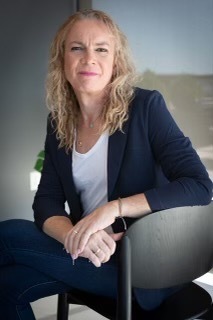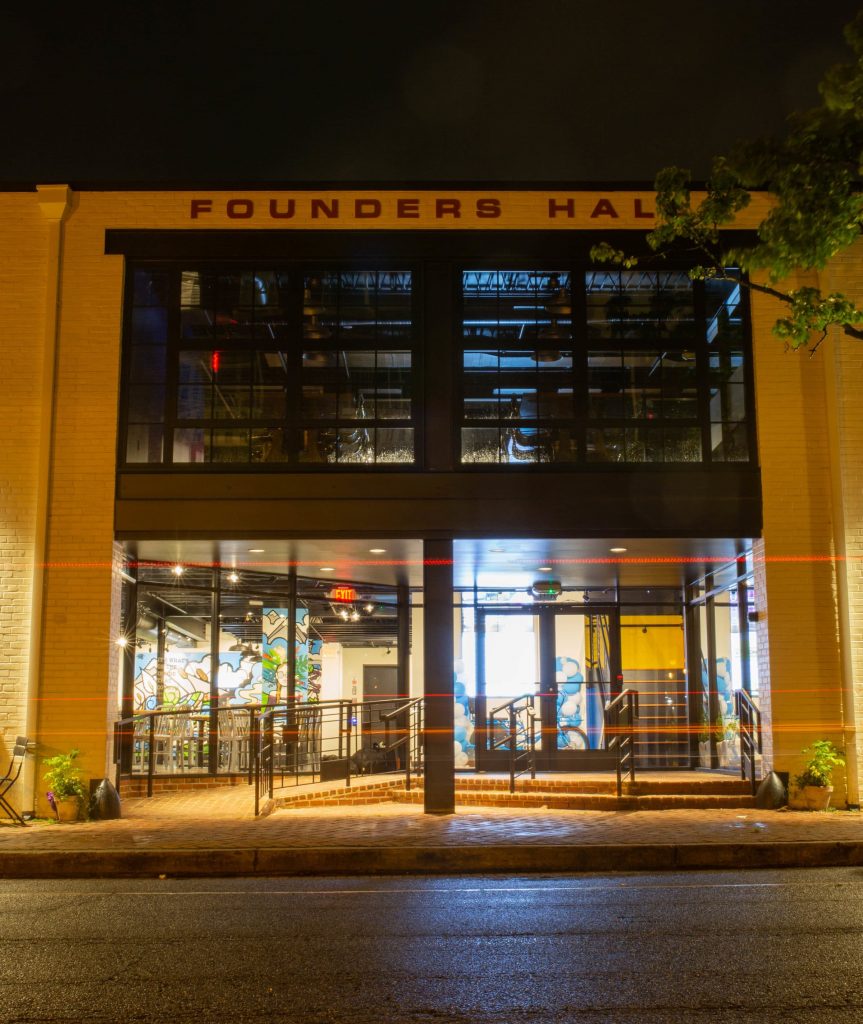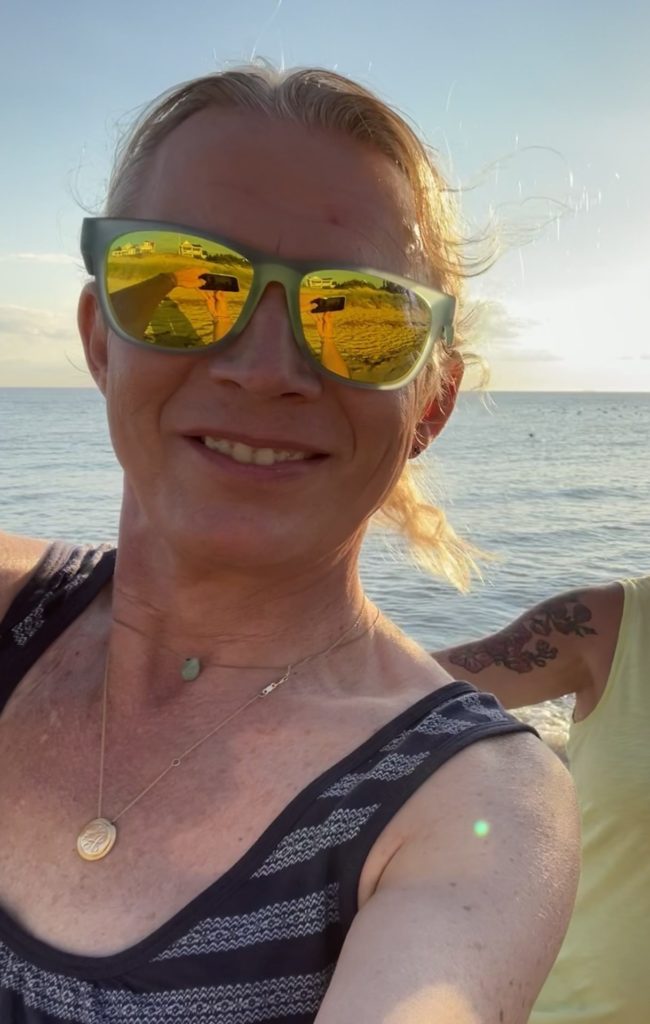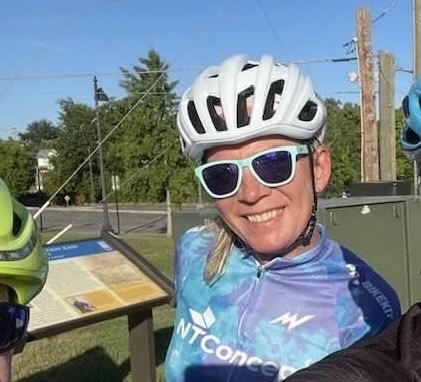Much of Amanda Kate Galbraith’s prior career in commercial real estate was spent in a constant state of flux. On paper, it looked like 23 years of working for the same global company, accruing over a million air miles and moving six times. In her mind, it looked like running away, the promise of the next move meaning maybe it would all just disappear, those constant waves of chaos inside that started in childhood would one day simply melt away.
In 2021, Amanda Kate—who’s been a Partner with ALX Community since its start, and now is Chief Investment Officer of her own real estate venture, 22 REH—moved to Old Town Alexandria. This time it wasn’t about running away. It was about settling in a place of acceptance where she could finally be herself.
We sat down together recently and talked about the then and now, the beautiful tangle of chaos in between, and coming out as transgender at 51. Here’s her story, in her words.

Tell me about where you grew up.
I grew up in Yorkshire, England. I spent the first 18 years of my life living in Yorkshire. It has two very distinct sides to it—the industrial side, because there’s a lot of places that were really at the forefront of the UK’s industrial revolution, the steel mills and the coal mining. But it’s also very rural, so the other side of Yorkshire is green rolling hills and cute villages.
It was a normal childhood. It certainly wasn’t tumultuous or anything like that. Nothing jumps out to me—when I think about those times—as challenging.
What memories do you have from college?
It was my first time actually running away somewhere. So it was kind of interesting—I think as far back as I can remember—there were two or three occasions where I thought I was able to run away. And one was running away to college. I knew at that point there was something that wasn’t… I didn’t feel comfortable with some things. And I was able to run away to college. Didn’t know what I was going to find when I got there! But I was able to run away.
After four years of college, I moved to London. I got a job with a company in the UK doing commercial real estate and worked for them for three years. And then one day the door opened in front of me asking if I’d like to go to the US. Which I couldn’t say no to. It was the next part of my adventure of running to the next place.
I moved to Washington, DC in 1993. I lived in northern Virginia, in Courthouse [Arlington], for five years. It was desolate at the time. There was nothing there. Clarendon was a parking lot.
Did you have roommates or did you live alone?
Roommates. I wanted to try and latch onto somebody, some place, somehow when I got here. I think I was afraid of living by myself.
Why would you be afraid of that?
Because I’d never had to live by myself. I didn’t like to be alone. When I was alone, my mind would fill with all kinds of thoughts about what was going on. So the way to keep my mind from it was to be as busy as possible.
I’ve heard you are a big cyclist, when did you get into that? Because that’s a very solo experience.
I actually got into triathlon first. The first triathlon I ever did was around 2006. At the time I was living in San Francisco. Triathlon was a place that I hid for about eight years. I was dealing with all kinds of emotions and… I mean, essentially, after I’d moved to the US, the busier I got, the less time my mind would think about things. I didn’t know what it was all about. I was scared and I continued to try and find ways to push the feelings under the rug. And one of the ways that I found was to fill not only my work time, but fill my spare time as well.
Triathlon was a way that physically hurt to push myself, and if I was hurting in other ways, it kind of helped disguise the pain I was in. I did a lot of races over a 14 year period.
What were your days like, working full-time while training for triathlons?
They were very busy. I had family and kids, too. It was getting up at 5 in the morning, training, going to work, coming home at night, doing it all over again. At that time everybody went to the office, every day.
You moved back to DC in 2008. Was that related to the recession?
No. To be honest I was traveling so much. Over the years, I’d been with the same company, I was promoted many times, and the more I was promoted, the more travel I did. My family was happier here and I was on a plane!
The travel, while I felt it would help keep me busy, had the opposite effect as I was spending so much time alone. This created more anxiety and it would fill my head with all kinds of different things that were going on with me. I traveled so much I was well over 100,000 miles a year of flying.
The bigger issue for me with leaving California was it was probably one of the biggest runaways I’d ever done, because at the time, I was in the running to be promoted and I knew that there were some things that I wasn’t … that weren’t right with me. I think at that point, it was one of the first times I really ran away from a job, having immersed myself in work to hide. It’s a hard thing to kind of put into words, because I knew it was good for my family, and I knew it was good for everybody involved, but I think by me running back here, it didn’t give me the opportunity that I probably was on the path for and maybe was meant to be.
In 2011, I moved to Philadelphia. Well, I commuted there from here. After lots of consultations between my spouse and I, we decided I was going to take the job that I was offered and travel up there on a Monday, back here on a Thursday.
But, I was then… I was now living by myself. So in my prior role I traveled, which meant I spent a lot of time alone, and now was the first time I truly lived by myself. I had a place there. That was one of the first times I suffered from major anxiety and depression. Things were unraveling.
Was it from being alone?
I think it was. I had kept myself secret for as long as I had. I was in a place where I could think about it all the time, I was in a place where I could access information through the internet, and started to search and look at more and more information. And I think that was one of the times that I started to really consider what the next few years were going to be like for me.
I lived there [Philadelphia] for two years, and then at some point I realized I needed a break. Being alone, having everything going on in my head as it was, the travel back and forth, the travel overseas, the pressures of a high-profile job. Things were spiraling a lot faster all of a sudden.
One of the things I’ve not mentioned is, I used to get these feelings, and I’d call them waves, because waves kind of come and sometimes they’re strong, and sometimes they’re very calm—just like the ocean. The waves were really all these thoughts that would fill my mind about what was happening. And why. From a very, very young age, I remember the waves, and I remember being filled with thoughts, and then they would go away—could be for months, it could be for weeks, or it could be for days. And then they would come back. By the time I was living in Philadelphia, those waves were getting stronger and stonger.
Was it a wave of one thing you could pinpoint, like a wave of anxiety? Or was it more like a sense of chaos from keeping everything inside?
I think it started with anxiety. Chaos and keeping everything inside is actually a very good way of putting it, because as the waves became stronger, they got more and more intense, and they were coming more often.
Did you ever talk to a therapist about it?
No.
You had nobody to talk to, essentially.
I had nobody to talk to, and I kept things from people who were very close to me; I decided at some point, if I was ever going to have a conversation about it, they were going to be the first to know. So going and talking to a therapist seemed to be… It wasn’t something that I was comfortable doing, because I wanted to give the one person who was closest to me the opportunity to understand first.

What would you change now, looking back?
For the longest time, I hid things. And hiding things wasn’t healthy. I think that talking about them sooner would’ve been better, instead of just assuming that I could manage the feelings,
Did you just feel like, one day it’ll all go away?
Yeah. I remember in the ‘80s thinking that I had no idea why it was there and maybe everybody felt that way? And it would just kind of disappear at some point?
Were any of your relationships suffering? Work, friends, family? Could they sense that something else was going on?
Yeah, I think that as time progressed from 2013, when I finally moved back from Philadelphia to here, year after year, I was continually trying to hide. I left the corporate real estate world and decided to take the time to step back from everything. I felt at the time, I didn’t know where my head was going with things, but being by myself or being in a smaller situation felt more manageable.
Part of doing something by myself, business-wise, was so that I felt like I could control my emotions. With the depression and the anxiety, I could choose where I wanted to work—I didn’t have to go to the office.
Walk me through the period of time between then and how you arrived at ALX Community.
I had previously bought portfolios of property which contained offices in Old Town. I was intrigued by Old Town—it was kind of cool and had a different vibe to it than other places in the DC area.
I was introduced to Scott [Shaw] in 2016. I was trying to do real estate deals, trying to build different ideas and put them together. Ironically, I was introduced to Scott by Trip Howell. I’ve known Trip since 1993—he was the leasing broker on the building that our office was in. He’s one of the first business people I met in DC outside of my job.
So Trip introduced me to Scott, and Scott and I hit it off. We would get together, talk different real estate deals, share ideas. I was with Scott the day that he identified Founders Hall as a potential place that he was going to buy. I helped him with the acquisition, and then from that, ALX was actually born, based on ideas Scott and I had kicked around.
Did both of you think coworking was going to be the end result?
Around that time—this would’ve been around 2017—Scott and I kept talking about the fact that traditional office space doesn’t work. We started doing research, and it led us to coworking or to some kind of service suites, and the more research we did, the more excited we got—this could be something we would do in this building. Now doing it ourselves wasn’t necessarily a thing at that time—it was more about, this could be a really great idea to service the local community. ALX was really born out of that.
If I go back to personally around that time, I was going through an awful lot of turmoil. Things really started to spiral out of control for me in 2018, 2019. I mentioned earlier the running away. I was doing triathlons, and I would be out running and truly think about running away. I mean, literally just carry on running. Because all my problems would disappear if I carried on running.
What did your spouse think was going on?
I think she just thought I was busy, I was dealing with stress, I was going through these midlife crises, whatever they were.
I think she suspected as time went along that something was really bugging me, but I was always noncommittal whenever asked about it. “I’m fine, I’m fine” as a constant answer.
But in that 2018-2019 period, I really remember that well. I was coming to Old Town fairly regularly. It was the first time that I didn’t want to get up in the morning. I just wanted to stay in bed some days. I hated going to meetings and having to introduce myself. Here we are, we’ve opened this new community, and all these people want to talk to you, and I think I became the partner that kind of hid myself away in a room and just did my role.
That was really when things started to spiral for me. The waves I referred to were getting stronger and really intense, to where I think, in 2019—I mean, it was no longer a wave, it was like a tidal wave. I couldn’t think. There were days I couldn’t hold conversations. I would literally decide I had to go home at 2 o’clock in the afternoon because I just couldn’t think.

Obviously you hit a breaking point. What was that?
I had a breaking point at the end of 2019. I was leaving town, and my spouse had given me a journal—it’s right before Christmas—and she said, I want you to write what you want to do in the next five years.
Because she knew you were unhappy, but that’s all that she could do?
I don’t know what she thought. We were going to be away at New Year’s, a way to welcome in the 2020s, and here’s a journal. I want you to write in the journal. Every day I want you to write while you’re away about what it is you want to do.
And still she had no idea.
She had no idea.
She just thinks you’re going through something.
Crises, stress, whatever it was. I went away and I couldn’t even open the journal for fear of what I really wanted to write. Or what I would write.
Did she expect it back, to read?
I think she expected I was going to come back with ideas and thoughts—if I wanted to travel, or do this one thing after the kids were done with college, whether we would retire here. What the grand plan would be.
And I just simply thought, Five years from now, I want to be myself.
I went on that trip not knowing what I was going to do with this book, and I came back from that trip with: I have to do something about this. Because if I don’t, I don’t know what will happen to me.
It was the first time I had ever admitted in my head that I couldn’t continue the way I was. And that was really the breaking point.
Where did you go?
I was in England. I was actually visiting my parents.
What was that like, having that kind of epiphany in your childhood home?
Maybe that was what brought up the, “I have to do something about this.”

But at the time, I didn’t know what that actually meant. Because I think that up to that point, I’d never admitted to myself where things could go, what things would happen. I’d researched about transgender issues. I’d researched about the anxiety and the pain and the depression and all of those things that I’d had. But I’d never, ever took the step of writing down on a piece of paper, “I am transgender.”
At the time, there was obviously no idea that the entire world would be closed down with a pandemic three months later. And, you know, as I departed, the things that were going around in my mind were, What’s it going to be like the next time I’m here? When will I be here the next time? Because I knew I had to move forward, but I just didn’t know how, when, what it was going to look like.
So coming back from that trip—first of all I admitted to my spouse that I didn’t write anything in the book. I made some excuses: I didn’t have time, I have some ideas, I’m just not ready to put them down on paper yet.
I come back, the first couple months of the year go by. Covid. March. And all of a sudden I have more time to think. I could feel the anxiety building and building and building, and my head just spinning and spinning and spinning. Hurting. Pounding some days.
And I kept looking at the book. But I did eventually write in it.
What was your first line?
My first line was, “I want to be me. I have to figure out how I’m going to do this, so this book is going to be the way until I’m comfortable enough being able to talk about it.”
When did you start?
In May 2020 I wrote for the first time in the book. And for the next month, I wrote every single thing I could ever remember about feelings I’d had, when they’d started, what I was doing at the time, what I wanted to happen.
I just wrote and wrote and wrote. It got to the point where every day, I’d spend an hour writing in the book. It was like, I’d allowed my floodgates to open and suddenly it was like that tidal wave just started pouring through. And it was June of 2020 that I realized I no longer had a choice. I had to tell.
What are some of the biggest challenges that you’d like to share?
I think that the challenges continue to be, 90 percent of the time, I’m so incredibly happy. I’m so full of joy for being able to discover, and find things that I’m thankful about.
But there’s always that 10 percent of the time where it is a challenge. The way I look is evolving. The way I sound is evolving, but it’s a challenge for me because at 50 years old, having had a body that was flooded with testosterone for 50 years, there are some things that take a lot longer to undo. Versus, you know, if I’d done this in my twenties.
Every now and again, something will happen. I remember early on I was in a bar one night meeting with somebody. There were two individuals at the bar and I could see they were talking about me. And that really upset me.
Seeing how transgender people are treated in the media upsets me. If I look at the US where we are, right now, as a country—that upsets me. Something like that can trigger something in my mind. You momentarily lose this confidence. If I’m misgendered in public, or if I’m misgendered on the telephone, just how it sets me into a tailspin. And then I’ve got to get my head around it and emerge on the other side.

What are some of the unknowns that you wished you had known?
Just how many incredible people would rally around me. That’s one. Two is, by releasing who I really was, how much more confident I became. How much I valued friendships and relationships where I’d kind of shut them out. And the satisfaction I get now from having friends—friends that I can now be myself around, people I knew that suddenly I’d become closer to, people I could talk to and listen to and engage with.
There’s probably a dozen people I would say became my new foundation. The support piece has been huge. Firstly, my spouse, who has been by my side every step of the way, and secondly I have two very, very close friends who I just knew were going to be my trusted allies. They were going to be my two girlfriends. And we are incredibly close.
Considering the huge role that work played in your identity before you came out, what is work like for you now? How do you view yourself in your role?
I’ll tell you two things about that. One is that ALX—for me—has since become sort of like a family. My peers, Kelly [Grant] and Scott, knew before I opened up publicly, and they were there to support me. In their minds, nothing changed. I was coming to work, doing my thing.
And within the community itself here, when I finally, really went public in July of 2021, when I first came to the office truly as myself—I never for one moment have felt uncomfortable here.
Did you think it would be different, or you just didn’t know?
I didn’t know. You know, you read all these horror stories of people who go to work and they get questioned by their coworkers, or people ignore them, or there’s chatter at the water cooler. I’ve never ever felt intimidated, I’ve never felt in any way unsafe, or in doubt about our community, which has been just such a huge, huge, huge thing for me.
Would you say work is still very much a part of your identity?
No, I think I’ve switched that, so that work is a balance now with other things in my life. It’s not me. Whereas for 25 years when I was working in the real estate business, it was me. There was very little balance at that point.
I think my work habits have changed over the last two years. I enjoy coming to the office. But I also enjoy going and working in a different place, recharging and being able to think about different things as I’m working.
What’s it like being home in your apartment, alone, now?
I love it. Two years ago I stopped triathlon training and instead I took up cycling. I’ve had an incredible support system from a group of female cyclists who I cycle online with. I race in a series where there are 70 people racing together. It’s so much fun. I’ve got these incredible people who have taken me for who I am and made me part of their team.
What have you learned about yourself?
Strength. The inner strength that I was able to do this. The beauty of being able to be yourself is just incredible, that freeing of your mind. The confidence.
Everything feels right.
This interview has been condensed and lightly edited for clarity.

